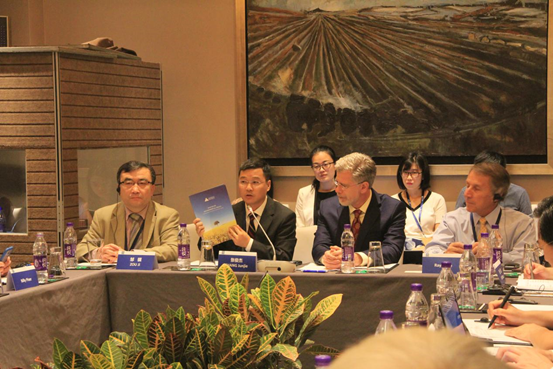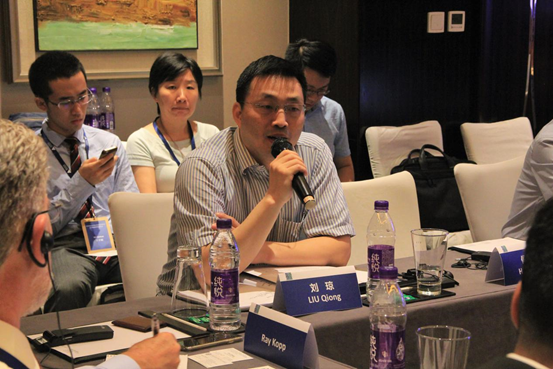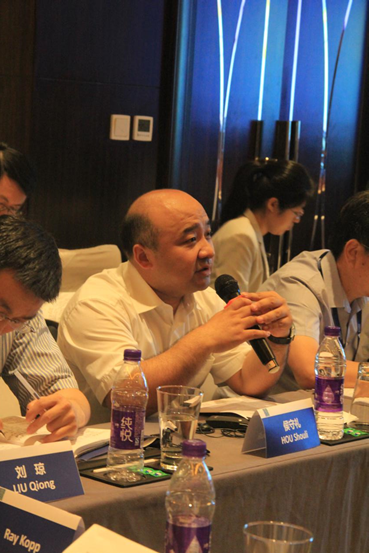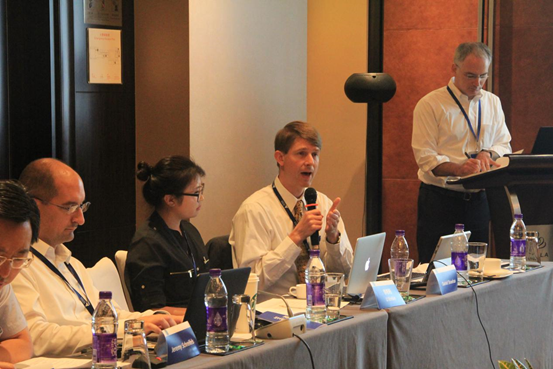A workshop on China’s Electricity Reform was held in Beijing on June 27, 2017. It began with an introduction to China’s energy and power industry and, following that entry point, the workshop went deeply into a discussion of the reform proposals in Decree No. 9 and other parallel policies, such as environmental taxes and the CO2 trading plans.
The workshop was organized jointly by Duke Kunshan University, Duke University, Resources for the Future (RFF) and Renmin University of China. Experts, scholars and policy makers from the power sector came together to discuss the current situation and future development of the power industry in China and in the US.
Since March 2015, the Central Committee of the Communist Party of China, the State Council released ‘A number of opinions on further deepening the reform of the power system’ (No. 9), the new electricity reform has really launched, it established the well-known policy in the industry – ‘Three to release, one to independent, three to strengthen.’ In July 2016, the National Development and Reform Commission and the Energy Bureau launched ‘Notice on the work of orderly development of generating and using electricity plan (Draft)’ to set up the work plan.’ After absorbing suggestions from different parties, the final version of the proposal was launched in April 2017.
Prof. Junjie Zhang, the Director of the Environmental Research Center, Duke Kunshan University, said the workshop identified the key obstacles to reform through a discussion about the theoretical and practical experience of the domestic and foreign electricity reform. It provided international experience for China’s electricity reform, and aimed to help the international academic community better understand China’s electricity industry.

Left to right: Ji Zou, Professor of Harbin Institute of Technology (Shenzhen) and Renmin University of China Junjie Zhang, Director of Environmental Research Center, Duke Kunshan University Richard G. Newell, President of Resources for the Future (RFF) Raymond J. Kopp, Deputy Director, Senior Researcher of RFF
‘This electricity reform has very comprehensive institutional design and the major supporting documents, which are the foundation of the reform, comprise a reasonable system design to promote the long-term closed electricity generation and sales side to conduct market-oriented transactions,’ Junjie Zhang said. ‘The market-oriented operation of sales price and the different objects that attract social capital will change the current benefits distribution and game of the entire electricity transaction participants.’ He continued, ‘As one of the organizers, Duke Kunshan University was very pleased to build this platform for well-known domestic and foreign experts and policy makers to exchange experiences.’
The first discussion of the workshop focused on China’s electricity policy and reform. The discussion was hosted by Ji Zou, the Professor of Harbin Institute of Technology (Shenzhen) and Renmin University of China. From the perspective of an environmental economics researcher, he shared his observation methods about the current state, prospects and problems of China’s electricity system. Subsequently, Qiong Liu, the Director of the Division of Electricity at Bureau of Economic Operations Adjustment, National Development and Reform Commission (NDRC), shared his viewpoint. He talked about his belief that China should consider its own national conditions in the process of reform, rather than completely copy the pattern of other countries and possibly take a greater detour. He mentioned that the core of Decree No. 9 lies in marketization, which can promote direct trade.

Qiong Liu, Director of Division of Electricity, Bureau of Economic Operations Adjustment, National Development and Reform Commission (NDRC)
Zhixuan Wang, the Vice President of China Electricity Council, talked about China’s environmental control and the related requirements in Decree No. 9 when viewed from a legal perspective, adding special mention of the significance of regulation. He also elaborated on the issues of electricity construction and renewable energy consumption, emphasizing that reform is not as simple as reducing electricity prices. Shouli Hou, the Director of the Division of Electricity Price at Department of Price, NDRC, introduced the status of China’s electricity price management, including the difficulties and challenges of market reform. He showed that in the case of exclusive buying and selling in grid companies, it is hard to achieve market-oriented pricing; he stressed the need to accelerate top design and to establish an effective electricity market to strengthen supervision.

Shouli Hou, Director of Division of Electricity Price, Department of Price, NDRC

Zhixuan Wang, Vice President of China Electricity Council
In the second discussion, the US representative introduced the institutional structure of the US electricity marker in the 21st century and the challenges facing the industry. Jeremy Schreifels, the Visiting Researcher of Resources for the Future, gave a wide-ranging talk that included potential reform in the US electricity market, the function and distinction of different regulators, the increase in renewable energy and distributed generation, carbon emission and other pollution restrictions, alternative market designs and worries about the market power. Dalia Patino-Echeverri, the Associate Professor of Nicholas School of the Environment at Duke University, explored deeply the integration of wind energy resources and environmental regulations. She argued that balancing supply and demand is very difficult for renewable energy, but she offered some practical ways to alleviate any shortage. Daniel Shawhan, the Visiting Researcher of Resources for the Future, demonstrated several experimental and automated simulations to predict the impacts of market design, policy and investment.

Dalia Patino-Echeverri, Associate Professor of Nicholas School of the Environment, Duke University

Daniel Shawhan, Visiting Researcher of Resources for the Future
The afternoon session focused on the practice of electricity reform. Fengyun Zhao, the Former Deputy Director General of Fire and Electricity Department at State Power Investment Corporation, gave a comprehensive overview of intelligent energy development, putting forward the five components of development: Reduce costs, provide more options for users, provide quality services, utilize renewable energy resources, and provide reliability for energy supply. Peng Wang, the Director of China Energy Policy Research Center, North China Electric Power University, introduced specific concepts of power system reform, elaborating on what should be reformed and what kind of model should be chosen instead. He stressed that the focus of reform is to establish an electricity market system, rather than a single bilateral relationship.
The workshop then presented cutting-edge research about China’s electricity industry. A representative of the Energy Economics Department, School of Economics, Renmin University of China, delivered a keynote speech on uncertainty in the electricity market and regulation. She talked about the dilemma of energy reform, the necessity of reform and several existing issues relating to it. Libo Wu, the Associate Dean and Professor of School of Big Data at Fudan University, shared the reform goals of different energy sectors and raised several points to consider: that the efficient use of hours is not enough, the abandonment of new energy, the issues of cross subsidy, and the problems that will faced by the electricity trading center that will be set up by the province in the future.

Libo Wu, Associate Dean and Professor of School of Big Data, Fudan University
In closing, Prof. Zhang Junjie from Duke Kunshan University and Richard Newell, President of the Future Energy Research Institute, held a discussion on the contents of the follow-up study, conceiving possible future research topics and forms of cooperation.

